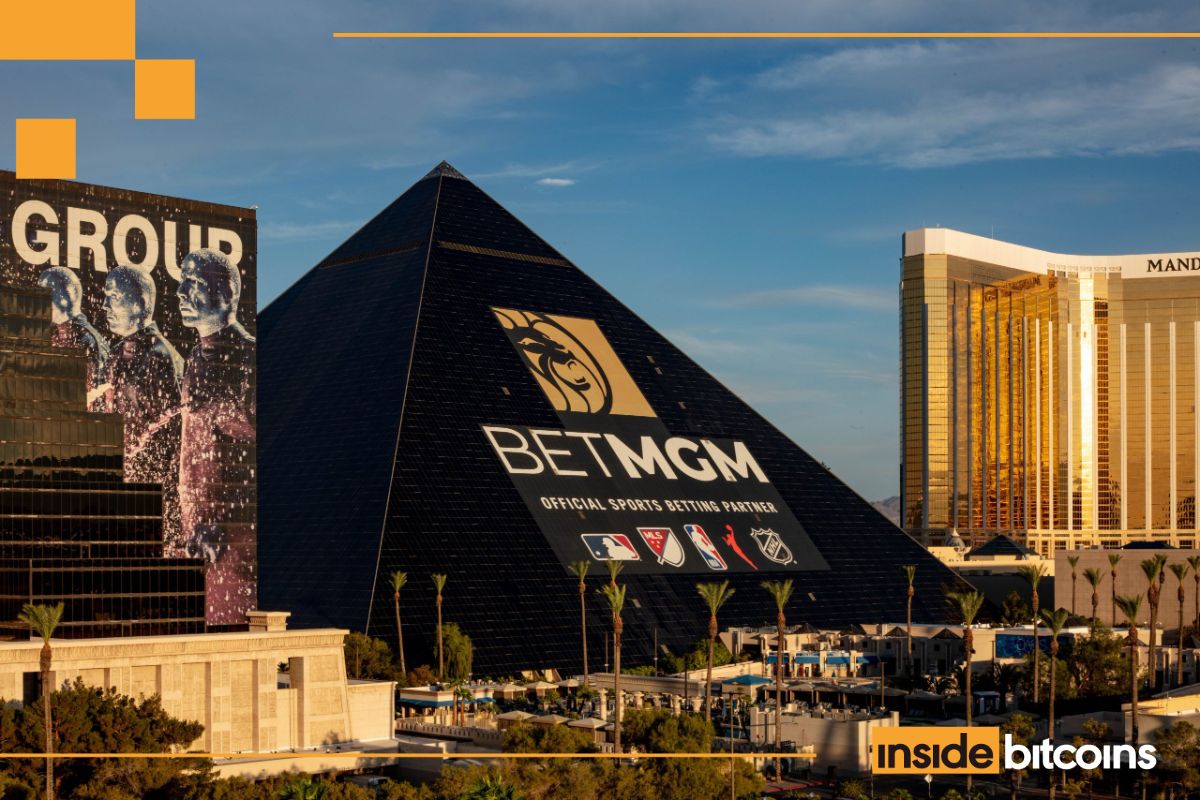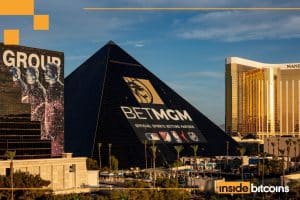In a significant development for the North American gaming landscape, BetMGM has substantially upgraded its financial outlook for 2025, reflecting the company’s impressive performance across both iGaming and sports betting verticals. This upward revision comes as the joint venture between global gaming powerhouse Entain and hospitality giant MGM Resorts International continues to capitalize on the rapidly expanding regulated gambling market in the United States.
BetMGM’s Updated Financial Projections
The latest guidance from BetMGM paints an optimistic picture of the company’s financial trajectory. Net revenue is now projected to reach at least $2.6 billion for fiscal year 2025, a notable increase from the previous forecast range of $2.4 billion to $2.5 billion. This adjustment reflects the company’s strong performance through mid-June, with trading patterns broadly consistent with the impressive 34% year-on-year revenue growth delivered during the first quarter.
Perhaps even more striking is BetMGM’s revised EBITDA (Earnings Before Interest, Taxes, Depreciation, and Amortization) projection, which now stands at a minimum of $100 million for 2025. This represents a significant upgrade from earlier guidance that merely suggested the company would turn EBITDA positive during the year. The improved outlook stems from strong contribution across both the online sports betting segment and the iGaming vertical, with the sports betting division now expected to be contribution positive for the full fiscal year.
Looking further ahead, BetMGM leadership has expressed confidence in achieving $500 million in EBITDA “in the coming years,” underscoring the long-term growth potential of the business. The company plans to provide more detailed information during its upcoming H1 update, scheduled for July 29, 2025.
The BetMGM Partnership: A Brief History
To understand BetMGM’s current position, it’s worth examining the origins of this powerful joint venture. BetMGM was established in 2018 as a 50/50 partnership between MGM Resorts International and Entain (then known as GVC Holdings). The collaboration was designed to capitalize on the newly liberalized US sports betting market following the Supreme Court’s repeal of the Professional and Amateur Sports Protection Act (PASPA) that same year.
The partnership leverages the complementary strengths of both parent companies: MGM Resorts contributes its iconic brand recognition, extensive customer database, and physical casino presence across the United States, while Entain provides its sophisticated technology platform and expertise in online gaming operations. This combination has enabled BetMGM to rapidly establish itself as one of the leading players in the North American online gambling market.
Headquartered in New Jersey, BetMGM offers sports betting and online gaming via market-leading brands including BetMGM, Borgata Casino, Party Casino, and Party Poker. The company has exclusive access to all of MGM Resorts’ U.S. land-based and online sports betting, major tournament poker, and online gaming businesses, creating significant cross-selling opportunities between physical and digital channels.
Entain’s Evolution and Strategic Direction
Entain’s journey to becoming a global gaming powerhouse is a story of strategic transformation and acquisition. The company was originally incorporated in Luxembourg in 2004 as Gaming VC Holdings S.A., founded by a group of American businesspeople led by Steve Barlow. Its initial focus was on acquiring Casino-Club, an online casino established in 2001 that had become the largest online gambling operator in German-speaking countries.
In 2010, the company reorganized in the Isle of Man as GVC Holdings, marking the beginning of an aggressive expansion strategy. A significant milestone came in 2012 when GVC partnered with William Hill to acquire Sportingbet, with GVC taking control of all markets except Australia and Spain. The company’s transformation accelerated in 2016 with the £1.1 billion acquisition of Bwin.Party Digital Entertainment, which helped reverse years of declining sales.
December 2017 saw GVC agree to purchase Ladbrokes Coral in a deal worth up to £4 billion, completed in March 2018. That same year, the company entered into its $200-million joint venture with MGM Resorts International to create BetMGM, positioning itself to capitalize on the newly liberalized US sports betting market.
In November 2020, GVC rebranded as Entain, signaling a strategic shift toward operating exclusively in fully regulated markets. This commitment to regulation has continued with subsequent acquisitions, including Baltic-based Enlabs (acquired for £314.6 million in 2021) and Portuguese operator Bet.pt, which together expanded Entain’s presence to 27 regulated markets worldwide.
Today, Entain is a FTSE100 company and one of the world’s largest sports betting and gambling groups, operating both online and in the retail sector. Its comprehensive portfolio includes established sports brands like BetCity, bwin, Coral, Crystalbet, Eurobet, Ladbrokes, Neds, Sportingbet, Sports Interaction, STS, and SuperSport, alongside gaming brands such as Foxy Bingo, Gala, and partypoker.
MGM Resorts International: From Vegas Icon to Global Entertainment Brand
MGM Resorts International’s evolution parallels the transformation of Las Vegas itself from a gambling-focused destination to a global entertainment hub. Founded in 1986 as MGM Grand, Inc., the company was established through the merger of Metro-Goldwyn-Mayer and United Artists, two iconic Hollywood film studios seeking to diversify their business interests.
The company’s first major project was the construction of the MGM Grand Hotel and Casino, which opened in 1993 and marked the beginning of MGM’s expansion into the hospitality and entertainment industry. Over the subsequent decades, MGM Resorts has grown into one of the world’s leading hospitality firms, operating a diverse portfolio of properties including luxury hotels, casinos, restaurants, and entertainment venues globally.
A pivotal moment in MGM’s history came in 2007-2008 during the global financial crisis, when the company implemented “Project Evolve” to introduce new cost discipline and avoid bankruptcy. This challenging period laid the foundation for unifying the company, which had previously operated as separate entities following the merger of MGM Grand and Mirage Resorts.
The past decade has seen MGM Resorts undertake a sweeping strategic and cultural transformation, essentially building a new company on an entirely new trajectory. This has involved turning a casino-driven, Las Vegas-anchored operation into a global entertainment brand offering a diverse portfolio of guest experiences. The partnership with Entain to create BetMGM represents a key component of this strategic evolution, allowing MGM to extend its brand into the digital realm and capitalize on the growing online gambling market.
The Competitive Landscape: BetMGM vs. Industry Rivals
BetMGM operates in an increasingly competitive North American sports betting and iGaming market, where it currently holds the position of third-largest operator behind FanDuel and DraftKings. As of late 2023, BetMGM controlled approximately 15% of the sports betting market, compared to FanDuel’s 39% and DraftKings’ 34%. In the broader online gambling sector (including both sports betting and iGaming), the competitive landscape has been shifting, with DraftKings overtaking FanDuel for the top position in Q3 2023 with a 31% market share compared to FanDuel’s 30%.
Beyond these major players, BetMGM faces competition from a diverse array of rivals. These include established gaming brands like Caesars, which edges out BetRivers for fourth place in the sports betting market with approximately 6% share. Other competitors include Hard Rock Digital, which offers a mobile sportsbook app, and newer entrants like ESPNBet, which launched in November 2023 through a partnership with Penn Entertainment and has already gained several percentage points of market share from BetMGM in states like Pennsylvania and Michigan.
International operators also present competitive challenges, with companies like Bet365 generating substantially more revenue than BetMGM globally. Founded in 2000 in Stoke-on-Trent, England, Bet365 operates in the same industry segment but generates an estimated $4.6 billion more revenue than BetMGM. Similarly, Betonline, founded in 1991 and headquartered in Panama City, Panama, competes in the application software field and reportedly generates $236.5 thousand more revenue than BetMGM.
Despite this intense competition, BetMGM maintains several competitive advantages. Its strong casino platform makes it appealing for users who want both sports betting and casino experiences in one place. The company’s retail partnerships allow customers to visit physical locations alongside online options, while its established brand as part of the MGM Resorts family provides trust and recognition in the market. However, analysts note that BetMGM faces challenges including a limited rewards program that favors in-person MGM resort visitors, limited availability in some states, and mobile app ratings that lag slightly behind some competitors, particularly on Android devices.
The US Sports Betting Market: Explosive Growth and Regulatory Evolution
The environment in which BetMGM operates has transformed dramatically since the US Supreme Court struck down PASPA in 2018, opening the door for states to legalize sports betting. As of June 2025, sports betting is legally licensed in 39 US states along with Washington, D.C. and Puerto Rico, totaling 41 jurisdictions where sports betting is legal in some form. Missouri is set to become the 40th state—and 42nd jurisdiction—with legal sports betting by the end of 2025, while ten states (Alabama, Alaska, California, Georgia, Hawaii, Idaho, Oklahoma, South Carolina, Texas, and Utah) still have no legal market.
The financial impact of this regulatory expansion has been enormous. The US sports betting market size was estimated at $17.94 billion in 2024 and is expected to grow at a compound annual growth rate (CAGR) of 10.9% from 2025 to 2030. This growth is primarily driven by the legalization of online and mobile wagering across multiple states, the convenience of mobile platforms, increasing sports viewership, and evolving consumer behavior toward real-time, interactive betting.
The scale of betting activity is equally impressive. After taking in $57.6 billion in total legal wagers for the first five months of 2025, the US has now seen nearly $520 billion in bets at legal sportsbooks since PASPA was repealed in 2018. The industry’s hold percentage (the percentage of wagers retained by operators as revenue) has steadily increased from 6.7% in 2018 to 9.6% in 2025, while tax revenue has grown from $40.3 million in 2018 to over $1.2 billion in the first five months of 2025 alone.
Alongside sports betting, the iGaming (online casino) market has also experienced substantial growth. The US iGaming market is projected to become the world’s largest regulated iGaming market by 2024, with gross gaming revenue (GxGR) expected to reach $8.2 billion that year, surpassing the $7.5 billion GGR of the UK iGaming sector. By 2027, the US iGaming market, which includes crypto casinos, is forecast to be valued between $10.8 billion and $13.7 billion.
Technological Innovation in Sports Betting
BetMGM’s growth is occurring against a backdrop of rapid technological innovation in the sports betting industry. Several key technological trends are reshaping the sector in 2025:
Artificial Intelligence (AI) and Machine Learning (ML) are significantly impacting sports betting by analyzing massive datasets to improve decision-making. AI algorithms track betting trends, player performance, and game conditions to provide personalized betting options for users, while ML models process historical and real-time data to predict game outcomes accurately. These technologies also enhance security by detecting fraudulent activities like match-fixing and suspicious betting patterns.
Blockchain technology is revolutionizing the betting industry by introducing unmatched transparency. Every transaction is recorded on a decentralized ledger, ensuring that betting platforms remain fair and tamper-proof, while smart contracts enable automated payouts based on verified results.
The integration of these advanced technologies is central to BetMGM’s 2025 strategy, which emphasizes using cutting-edge technologies and data analytics to optimize live betting experiences. CEO Adam Greenblatt has highlighted the company’s dedication to staying competitive through tech integration and personalized user experiences, with plans to add exclusive games, strategic partnerships, and first-to-market innovations to retain and engage users.
Responsible Gambling Initiatives
As the gambling industry expands, responsible gambling initiatives have become increasingly important. BetMGM and its parent companies are implementing various measures to promote safe gaming practices. These include leveraging AI and machine learning to identify “at-risk players” by analyzing behavioral patterns and flagging concerning gambling habits for timely intervention.
Modern gaming platforms like BetMGM are prioritizing user-friendly responsible gambling tools such as self-exclusion options, deposit limits, and time-out periods. These features are becoming standardized, with many operators developing apps that not only provide these features but also educate players on responsible gambling practices.
Partnerships between gaming operators and mental health organizations have become crucial in promoting responsible gambling efforts. These collaborative programs offer counseling services and support networks for players struggling with gambling addiction. By aligning with mental health professionals, operators can foster a culture of concern and awareness.
Recent Regulatory Challenges: The Illinois Gaming Board Case
BetMGM’s operations occasionally face regulatory scrutiny, as illustrated by a recent case involving the Illinois Gaming Board. In June 2025, the board ruled in favor of BetMGM in a dispute with a Chicago-area bettor named Mark Aiello, who had filed a complaint after BetMGM declined to honor what he believed were winning bets placed during the NCAA’s March Madness basketball tournament.
Aiello had placed a series of prop bets involving the performance of Chicago Bulls players, including specific totals for rebounds and assists, which according to his calculations would have resulted in a $389,000 payout. However, BetMGM voided these bets prior to the start of the games, citing an “obvious error of incorrect or inflated odds” in its pricing system.
The Illinois Gaming Board’s investigation confirmed that BetMGM’s odds had not been properly updated at the time Aiello placed his wagers. Despite this, the board concluded that such errors are covered under the terms and conditions of the sportsbook and, under state gaming regulations, render the wagers voidable. This case highlights the complex regulatory environment in which sports betting operators must navigate, balancing customer satisfaction with compliance requirements and risk management.
Related News
- MGM Resorts and BetMGM Strengthen Responsible Gambling Initiatives as Problem Gambling Awareness Month Approaches
- Michigan Supreme Court to Hear Casino Dispute Over $3M Win
- Online Advertising’s Influence on Youth: A Closer Look at Gaming and Gambling
- Canada Highlights Concerns Over Links Between Online Gambling and Drug Trafficking


